New Arab Voice Podcast ft. Arise: Moved, abused and forgotten: Trafficking in the Middle East
- Aug 10, 2021
- 3 min read
Updated: Sep 13, 2021
Arise Director Luke de Pulford joins the New Arab Voice to discuss human trafficking in the Middle East.
Moved, abused and forgotten: Human Trafficking in the Middle East
(04.35) July 30th marked World Day Against Trafficking in Persons. It's a global problem to which the Middle East and North Africa is not immune. Thousands of men, women and children are trafficked every year into and from the Middle East for forced labour, sexual exploitation or other forms of abuse. Much of this trafficking and abuse can either go undetected, unreported or stuck in a legal grey zone where the local laws allow for it. But the basics first: What is human trafficking?
Luke: Generally what we mean is a family of different types of exploitation which involve movement.
This is Luke de Pulford, Human rights campaigner and Director of Arise, an anti-slavery and human trafficking organisation working across the globe.
Luke: The UN has a definition in the Palermo Protocol, which is a 2003 legal document, which does set out what trafficking is - movement from one place to another for the purpose of exploitation, that might be for sexual exploitation, it might be for organ trafficking or it might be for labour. So those are the generally categories. It is quite narrowly defined.
According to UN data the majority of the victims trafficked to the Middle East are from East Asia and North and East Africa.
Luke: And in countries where economies are weaker, you'll find that people will do anything in order to sustain their family, even moving abroad to work in a situation which they know is high risk. And many of them do that. So I know people, for example, from the Philippines who had been to seminars about human trafficking and the risks associated with migrating for work to the Middle East, but they'd gone anyway. Why? Because they were desperate.
The recruitment agencies who tempt victims to the Middle East have an alluring sales patter - greener grass, roads paved with gold, enough money to send back to relatives at home to pay for an education for children. For many it can be an offer too good to pass up.
Luke: In reality they can find themselves transported off into a country they were not expecting even to go to. They find themselves trapped sometimes in a Kafala system, over which they have no control, their passports and other documents confiscated, often trapped in very serious debt bondage, which takes them years to pay off before they've earned a penny to send home to their families.
For years, the terms "human trafficking" and "modern day slavery" have been linked to the Kafala system. The Kafala system is a system of sponsorship - a worker is offered employment with a company or individual who then becomes the employee's sponsor. They become tied to the employer who then, to all intents and purposes, has ownership over the individual.
Luke: So that employer has the rights, in some countries, to the passports and other identity documents of the person who they employ. That obviously lends itself to huge abuse because that person can't move. So it relies upon the employer being willing to treat the employee well for the system to work. It hasn't been working in a lot of circumstances, which is why there's been this movement towards reform. This is a great thing but there is along way to go.
When it comes to securing the release of trafficking victims and bringing prosecutions against those who have committed abuses, the odds are stacked against the affected individual.
Luke: Well its very difficult in most jurisdictions and its, in some ways, particularly difficult in the Middle East because the laws won't necessarily be in place in order to enable them to seek redress and, even if they could, they are foreign nationals and their status often has an impact on their ability to seek justice. Quite apart from the fact that it costs money, there might be a language barrier - all the kinds of access problems that you normally face when victims of exploitation are trying to seek justice.
While the prospect of ending human trafficking remains a monumental task, the chance, however small, for justice and redress is a lifeline to those who have suffered.




